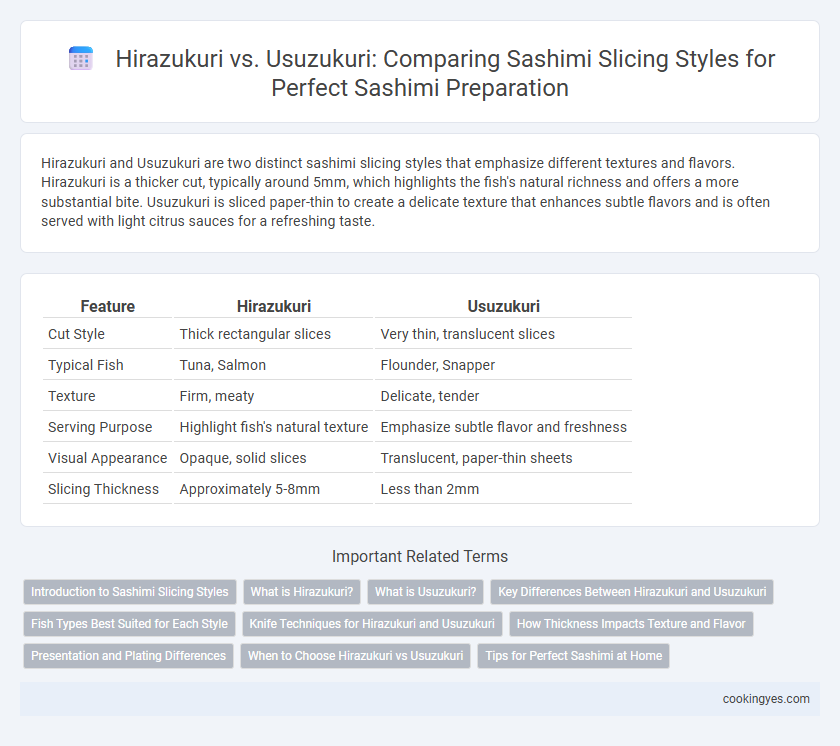Hirazukuri and Usuzukuri are two distinct sashimi slicing styles that emphasize different textures and flavors. Hirazukuri is a thicker cut, typically around 5mm, which highlights the fish's natural richness and offers a more substantial bite. Usuzukuri is sliced paper-thin to create a delicate texture that enhances subtle flavors and is often served with light citrus sauces for a refreshing taste.
Table of Comparison
| Feature | Hirazukuri | Usuzukuri |
|---|---|---|
| Cut Style | Thick rectangular slices | Very thin, translucent slices |
| Typical Fish | Tuna, Salmon | Flounder, Snapper |
| Texture | Firm, meaty | Delicate, tender |
| Serving Purpose | Highlight fish's natural texture | Emphasize subtle flavor and freshness |
| Visual Appearance | Opaque, solid slices | Translucent, paper-thin sheets |
| Slicing Thickness | Approximately 5-8mm | Less than 2mm |
Introduction to Sashimi Slicing Styles
Hirazukuri and Usuzukuri represent two primary sashimi slicing styles essential for showcasing texture and flavor. Hirazukuri features thick, rectangular cuts that emphasize the fish's natural firmness, while Usuzukuri offers ultra-thin slices ideal for delicate, translucent presentations. Both techniques enhance the sashimi experience by tailoring slice thickness to specific fish types and dining preferences.
What is Hirazukuri?
Hirazukuri is a traditional sashimi slicing technique characterized by thick, rectangular cuts of fish, typically around 5 mm thick, providing a firm texture and rich flavor absorption. This style highlights the natural taste and mouthfeel of meatier fish like tuna and salmon, making it ideal for sashimi appetizers. In contrast to Usuzukuri, which involves paper-thin slices, Hirazukuri offers a more substantial bite and visual appeal through its uniform, chunky presentation.
What is Usuzukuri?
Usuzukuri is a sashimi slicing technique that produces paper-thin slices of fish, typically less than 1 millimeter thick, allowing for a delicate texture and enhanced flavor release. This method is often used for white fish such as flounder or sea bream, highlighting their subtle taste and smooth mouthfeel. The thinness of Usuzukuri slices contrasts with the thicker Hirazukuri style, which emphasizes more substantial, knife-cut textures.
Key Differences Between Hirazukuri and Usuzukuri
Hirazukuri sashimi slices are thick, typically about 10mm, providing a meatier texture ideal for fish like tuna, while Usuzukuri slices are paper-thin, often less than 2mm, enhancing the delicate flavors of white fish such as flounder. The thickness in Hirazukuri emphasizes the natural chewiness and bold taste of the fish, whereas Usuzukuri highlights subtle freshness and transparency, often arranged to showcase artistry. Texture, thickness, and the choice of fish distinctly differentiate Hirazukuri's robust feel from Usuzukuri's refined delicacy.
Fish Types Best Suited for Each Style
Hirazukuri slicing style, characterized by thick rectangular cuts, is best suited for firmer fish such as tuna and yellowtail, which benefit from the substantial texture and flavor retention. Usuzukuri, featuring ultra-thin slices, complements delicate fish like flounder or sea bass, enhancing their subtle freshness and tenderness. Selecting the appropriate slicing style improves both the aesthetic presentation and the eating experience by matching the fish's texture and flavor profile.
Knife Techniques for Hirazukuri and Usuzukuri
Hirazukuri sashimi slicing technique involves cutting fish into thick, rectangular slices, typically using a single, smooth stroke with a yanagiba knife to maintain the flesh's texture and presentation. Usuzukuri requires precise, paper-thin slices achieved by angling the yanagiba blade almost horizontally, allowing delicate transparency and a melt-in-the-mouth experience. Mastery of these knife techniques preserves the fish's structural integrity and enhances visual appeal, crucial for authentic sashimi preparation.
How Thickness Impacts Texture and Flavor
Hirazukuri sashimi slices, typically 5-7mm thick, deliver a firmer, meatier texture and more pronounced umami flavor due to the denser flesh exposure. Usuzukuri, cut paper-thin at around 1-2mm, offers a delicate, almost melt-in-the-mouth experience that highlights subtle freshness and lightness of the fish. The thickness directly influences the sashimi's mouthfeel and flavor intensity, making slice style crucial for enhancing specific fish varieties like tuna or flounder.
Presentation and Plating Differences
Hirazukuri sashimi is cut into thick, rectangular slices that highlight the texture and richness of the fish, creating a visually bold and substantial presentation ideal for fatty cuts like tuna. Usuzukuri features paper-thin, translucent slices arranged delicately in overlapping or circular patterns that emphasize elegance and subtlety, often preferred for lighter fish such as flounder. The plating of hirazukuri tends to showcase robust portions with minimal garnish, while usuzukuri often incorporates intricate garnishes like citrus slices or shiso leaves to enhance the refined aesthetic.
When to Choose Hirazukuri vs Usuzukuri
Hirazukuri slicing style is ideal for firmer fish like tuna or salmon, as its thick, rectangular cuts emphasize the meat's texture and flavor. Usuzukuri is preferred for delicate, white-fleshed fish such as flounder or sea bream, offering paper-thin slices that enhance subtle flavors and provide a refined mouthfeel. Choosing between Hirazukuri and Usuzukuri depends on the fish's texture and the desired eating experience, balancing thickness for robustness or thinness for elegance.
Tips for Perfect Sashimi at Home
Mastering Hirazukuri and Usuzukuri slicing techniques enhances sashimi presentation and texture; Hirazukuri offers thick, firm slices ideal for fatty fish like salmon, while Usuzukuri produces thin, delicate cuts perfect for white fish such as flounder. Use a sharp, long yanagiba knife to ensure clean, precise cuts that maintain fish integrity and maximize flavor. Keep the fish chilled and slice in a single, smooth motion to prevent tearing and retain optimal freshness for a professional sashimi experience at home.
Hirazukuri vs Usuzukuri for sashimi slicing style Infographic

 cookingyes.com
cookingyes.com